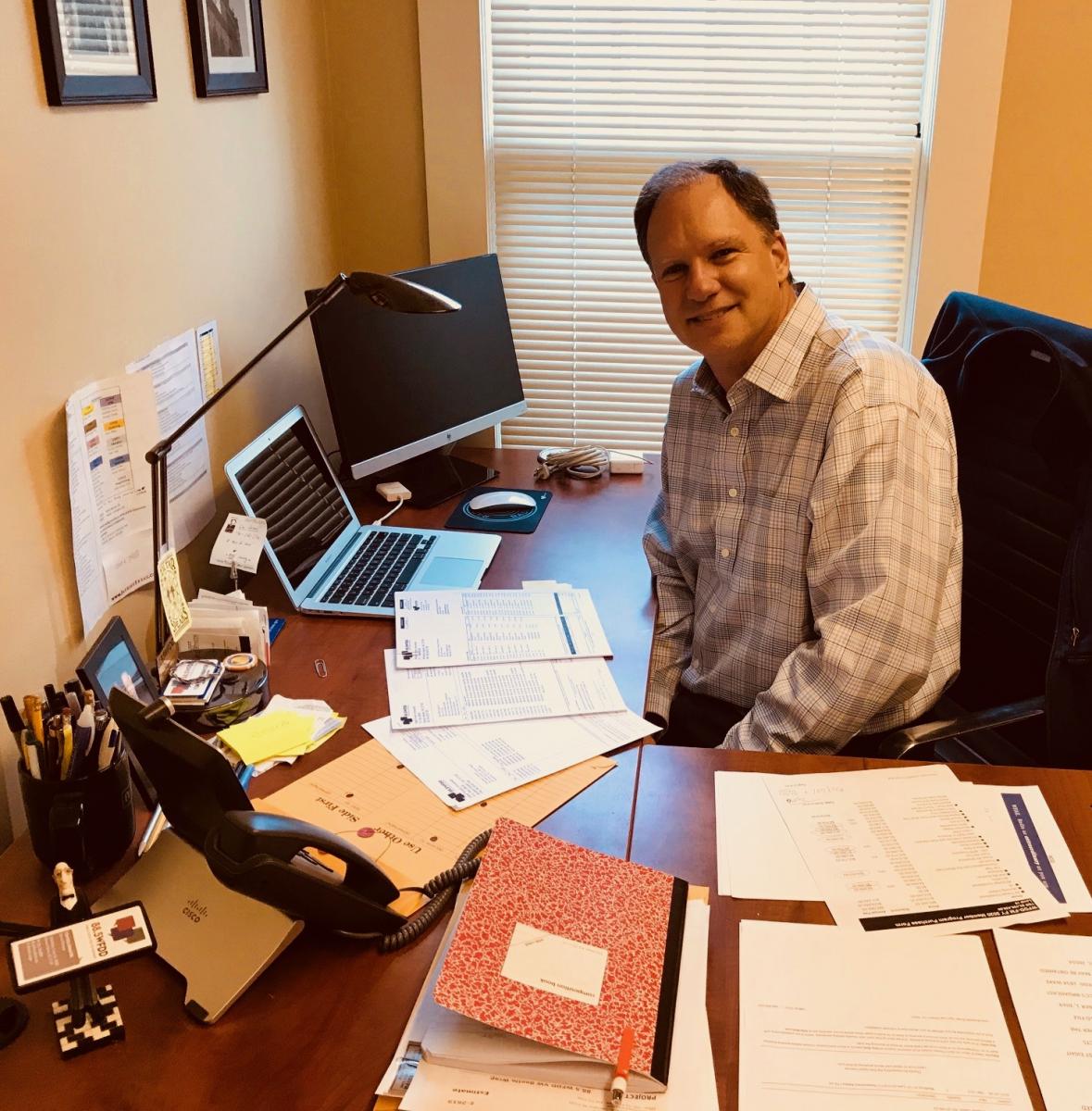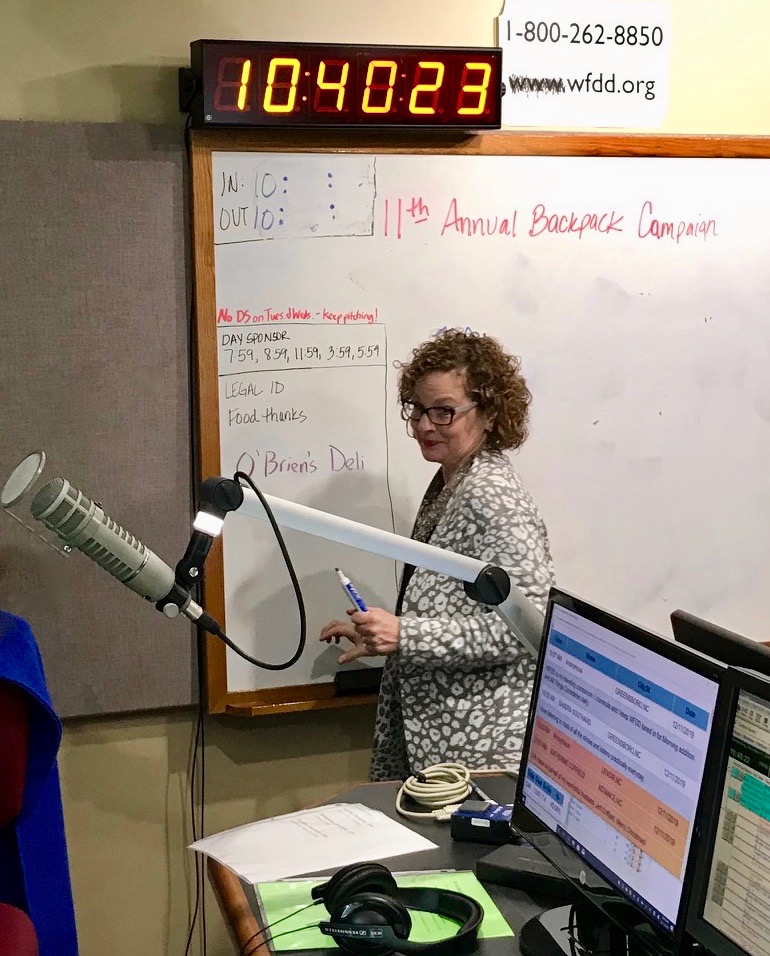If you're a regular listener to the station, chances are you're well familiar with on-air announcements that begin: “Support for WFDD comes from..."
But what exactly do we mean by support, and where does it come from anyway?
Loyal WFDD listener Beth Shaw takes her curiosity a step or two further on this episode of Carolina Curious.
“Can you explain the difference between underwriting and advertising and the influence on the broadcaster?" asks Shaw. "I think viscerally we all recognize the difference between a commercial ad that you hear on other stations and the brief underwriting messages on WFDD, but I was curious about two things. One, is there a hard definition of this — a line where if you do this it becomes an ad and if you do that it stays an underwriting message? And I was also interested in the impact on the journalists and the people working at the station. Is it a different environment because you have underwriting instead of advertising?"
Reporter David Ford turned to his WFDD colleagues in administration, marketing, underwriting, and news to find the answers, beginning with a bird's-eye view from WFDD General Manager Tom Dollenmayer.
He says, “The big difference is commercial stations exist to really build a big audience that's in a certain demographic, certain age, certain income and then sell that to an advertiser.”

WFDD, on the other hand, encourages folks to support us through business underwriting. It's kind of like saying, "Hey, here are some people who we think really fit with your product. You should probably support the station and let them know that you're here."
“But it's not that inducement to buy," says Dollenmayer. "Like, ‘The Toyotas are on sale this month for this much,' kind of high-pressure 30-second announcements. Most commercial stations spend about fifteen minutes an hour in commercial time. We offer twelve-and-a-half-seconds-long underwriting spots, and we offer about six of those an hour.”
There are plenty of upsides for being a big commercial station. For starters, all those commercials bring in millions and millions of dollars. As a non-commercial station, WFDD relies on the federal government for about five percent of its budget, between five and six percent comes from Wake Forest University and the rest from the community. Individual business underwriting brings in roughly $800,000, and listeners, about a million-and-a-half.
We're not putting on the Ritz, but there is a big payoff for our listeners.
“Oftentimes we will break format for a story or a series or a journalistic deep dive into some big issue," says Dollenmayer. "Commercial guys can't afford to do that.”
It all works because of the tireless efforts going on behind the scenes in WFDD's underwriting department.
“We're constantly trying to find new underwriters,” says Karen Kantziper. “So, we're prospecting every day whether it's online reading the news, riding in your car, seeing a commercial van riding by."
"Everywhere you go!" adds Sheila Thrower.
"Looking at the new store that's around the corner or the new restaurant," says Kantziper. "We are on the phone and email a lot and we're out meeting people.”

Underwriting Account Manager Karen Kantziper pauses from production duties during WFDD's 11th Annual Backpack Campaign fundraiser. DAVID FORD/WFDD
She says it's all about being persistent, determined, and optimistic. Then, once a business comes onboard and submits the underwriting message they'd like to announce on our air, it arrives at the desk of Assistant General Manager Molly Davis.
Davis edits the announcements and records them — hundreds each year. If anyone knows the difference between advertising and underwriting, it's Molly D.
“It really is still a tax-deductible donation to the station,” says Davis. “So, it's a thank-you message and that's why you're not going to hear calls to action, qualitative language, comparative language, inducements like pricing or sale information. We're not allowed to do any of that.”
Because if we do, WFDD can be fined up to six figures for violating the Federal Communications Commission's stringent rules and regulations. Davis says underwriters get clean, concise messaging with information about where the listener can find out more. Since spot sets are only 30-seconds long, public radio listeners don't change the channel, plus there's something extra.
“I often tell people about the halo effect which basically means that public radio listeners are so passionate about their station that they transfer that passion onto businesses and organizations that support their station,” she says.
But, News Director Emily McCord says underwriting on WFDD doesn't obligate the station to cover those organizations any differently when it comes to news.
“There's a really robust firewall in place between what's happening on the business side of WFDD and what's happening on the news-gathering side,” says McCord. “It really allows us to approach every story strictly from an editorial standpoint. And I think that is something that is not always present in a lot of other news outlets.”
WFDD is not beholden to corporate entities or other organizations, it is beholden to the facts and ultimately our listeners. Emily is quick to point out that we're not always perfect, but when errors are made, we're the first to acknowledge them, and issue corrections.
“Yes,” says McCord. "And in full disclosure, David, I'm probably going to be editing this story, so I'm going to make sure that I sound as good as possible in it. So, I have to say this blows away everything I was just saying about our internal policies! [laughs]"
You heard it here folks, on Carolina Curious!
300x250 Ad
300x250 Ad

